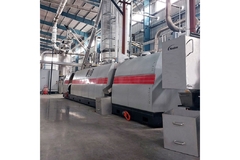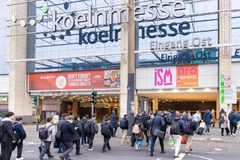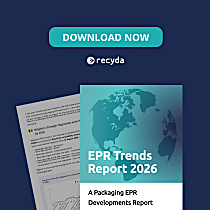Ganesha Ecopet expands PET recycling capacity with new facilities in India

05 Sep 2024 --- Ganesha Ecopet, a subsidiary of Indian PET recycler Ganesha Ecosphere, has ramped up its operations with the installation of two new Starlinger recoSTAR PET 165 HC iV+ recycling lines. Set up at the company’s facility in Warangal, India, the lines have tripled Ganesha Ecopet’s annual production capacity of bottle-grade recycled PET (rPET) from 14,000 tons to 42,000 tons.
This expansion marks a step forward for Ganesha Ecopet, which had already been producing recycled PET flakes and pellets for food-grade packaging, as well as filament yarns and fibers, on two Starlinger lines set up in 2022. The new lines are expected to reinforce the company’s position in the domestic and international markets, including the US and Europe.

“Our goal is not only to recycle plastics but to create premium-quality, sustainable and viable circular solutions for brands. Recycling is not just an environmentally responsible choice, it is a powerful way to reduce CO2 emissions and mitigate the effects of climate change,” says Sharad Sharma, managing director at Ganesha Ecosphere.
“Starlinger’s food-grade PET recycling technology, combined with the operational expertise we have built up over the last 30 years on the Indian waste recycling market, enables us to push the boundaries of what is possible in PET recycling.”
Demand-driven growth
The surge in demand for food-safe recycled PET in India right now is said to be driven by two key factors. First, the Indian government’s introduction of Extended Producer Responsibility as part of the Plastic Waste Management (Amendment) Rules in 2022 has compelled importers, brand owners and plastic waste processors to ensure systematic collection and recycling of plastic waste. By 2025, producers are required to include 30% post-consumer recycled content in PET bottles, a figure set to increase annually to 60% by 2029.
In that same year, the Indian government implemented a ban on various single-use plastic products to address pollution. Originally proposed in 2016 by prime minister Modi, the government called the ban “a defining step” to curb plastic waste and pollution.
Second, companies noticed a shift in consumer preferences, particularly among younger demographics such as millennials and Gen Z, who place greater emphasis on sustainability in their purchasing decisions. As a result, brands are increasingly adopting circular and sustainable packaging solutions, with recycled PET emerging as a leading option due to its continuous recyclability, lower carbon footprint and maintained product quality and durability.
In response to the demand, Sharma introduces that Ganesha Ecosphere provides “the best quality of recycled PET” that’s on par with virgin PET in terms of properties but with more environmental benefits in terms of reduced carbon emissions and energy savings.
“Various global FMCG brands like Coca-Cola have placed their trust in us to make their packaging circular while ensuring utmost safety and quality for the consumers.”
Enhancing waste management
To minimize the environmental impact of its operations, Ganesha Ecopet has implemented measures to recycle and reuse 95% of the consumed water. Additionally, the plant has increased its reliance on renewables in operation. With a total production capacity of 42,000 tons of food-grade recycled post-consumer PET, Ganesha Ecopet is said to be well-positioned to meet the rising demand for sustainable packaging in India and beyond.
“Ganesha Ecosphere is one of the trailblazers for a circular plastics economy in India. With its experience in the Indian plastics recycling sector and its willingness to invest in state-of-the-art technology, it is able to transform post-consumer scrap into a high-quality secondary raw material for plastic packaging producers,” says Paul Niedl, commercial head of Starlinger recycling technology.
Ganesha Ecopet sources post-consumer PET bottles through an extensive network of over 300 suppliers and aggregators across India, utilizing both online and offline channels.
Last year, the Circulate Initiative released a report analyzing the plastic recycling supply chain and infrastructure in Asian countries to understand local waste management systems and identify areas for improvement. In India, PET recycling performance was identified as the strongest.
“We are grateful for the partnership with Starlinger and especially applaud its highly advanced, food-safe bottle-to-bottle recycling technology as well as the continuous support that has made this feat possible and circular economy a reality,” says Sharma.











